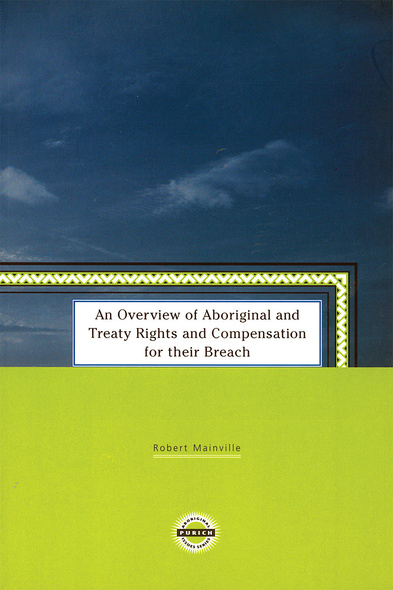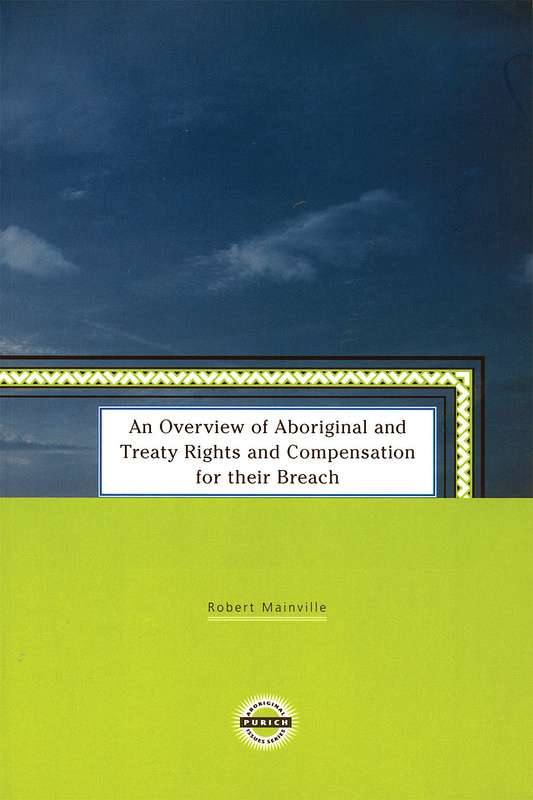
An Overview of Aboriginal and Treaty Rights and Compensation for Their Breach
A pressing issue today is how to compensate Aboriginal peoples for the infringement of their rights. Robert Mainville examines Aboriginal and treaty rights in an historical and legal context, explaining their origins and reviewing major Canadian court decisions that have defined Aboriginal rights. He points out that Aboriginal rights include more than Aboriginal title, and stresses the fiduciary relationship between the federal government and Aboriginal peoples. He also discusses the impact of the Canadian Constitution on Aboriginal rights, and the limits to the government's ability to infringe upon Aboriginal and treaty rights.
The heart of this book deals with the complex question of compensation for the infringement of Aboriginal and treaty rights. The author begins with the Canadian law of expropriation but argues that, while these principles can provide guidelines for compensation, expropriation law is inadequate to address the issue fully. He then examines American jurisprudence and concludes that the American experience, which involves complex legal maneuverings and narrowly applied principles, has not always led to justice for Native Americans.
Against this background, Mainville sets out clear and practical principles for determining appropriate compensation when Aboriginal or treaty rights are breached. These principles include: considering the government's fiduciary obligation; applying compensation uniformly across the country; adequately assessing the impact of the breach on the Aboriginal community as a whole; considering the benefits derived by the Crown and third parties; the need for structured compensation schemes that do not necessarily meet mathematically accurate tests; and assessing third-party responsibility for compensation.
The author begins by defining Aboriginal and treaty rights, and discusses limits on the government's ability to infringe them, as well as the government's fiduciary responsibility to Aboriginal peoples. He then discusses the principles for determining compensation for the breach of these rights, third party responsibility for compensation, and the American experience with compensation.
Robert Mainville practiced law in Montreal and represented Aboriginal peoples and First Nations for nearly thirty years. He was appointed a judge of the Federal Court of Canada in 2009. He has also lectured on Aboriginal rights in the law faculties at both McGill University and the Université du Québec á Montréal. He has written and lectured extensively on Aboriginal rights issues. He holds his first law degree from the Université de Montréal and his Masters in Law from McGill.
Introduction
Part I: Defining Aboriginal and Treaty Rights
1. Aboriginal Rights at Common Law
The Marshall Decisions
Historical Case Law|
Contemporary Case Law
The Constitution Act, 1982
The Identification and Content of Aboriginal Rights
Content of Aboriginal Title
2. Treaty Rights
Forms of Treaties and the Capacity to Enter into Treaties
The Nature of Treaty Rights
The Interpretation of Treaties
The Effect of Treaties
3. The Fiduciary Relationship Between Aboriginal Peoples and the Crown
Judicially Enforceable Duties and Obligations
Treaties and the Fiduciary Relationship
The Fiduciary Relationship and the Provincial Crown
4. Federal Common Law and Aboriginal and Treaty Rights
Federal Common Law
Constitutional Division of Powers
5. Legal Principles Governing the Infringement of Aboriginal and Treaty Rights
Extinguishment of Aboriginal and Treaty Rights
Infringement of Aboriginal and Treaty Rights
Infringement and Justification Tests
Principal Factors in the Justification Test
Part II: Principles of Compensation
6. A Review of Compensation in Cases of Expropriation Unrelated to Aboriginal and Treaty Rights
Market Value
Potential Value and Special Adaptability
Intrinsic Value and Equivalent Reinstatement
Consequential Impacts and Injurious Affection
7. The Experience in the United States
Recognized Aboriginal Issues
The Plenary Power of Congress
Fiduciary Obligations
Adequate Compensation
8. A Proposal for Principles of Compensation
Notes
Index





